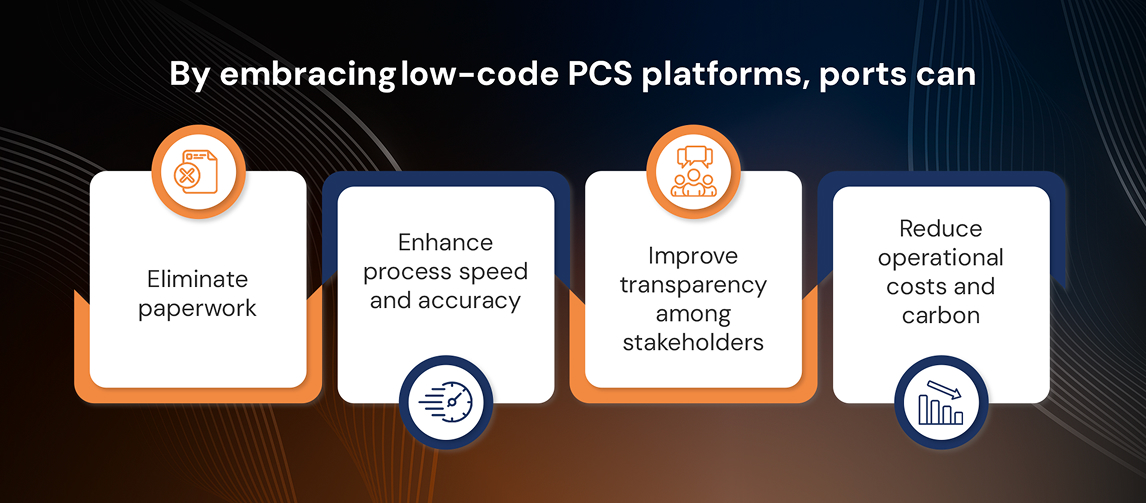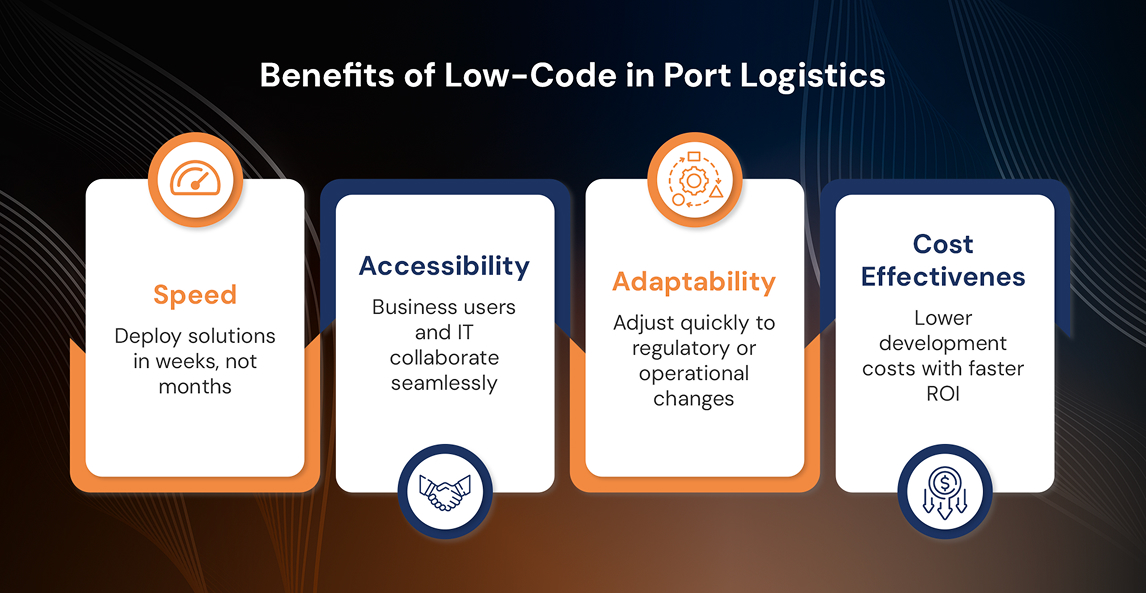Table of Contents
Introduction
In the complex world of maritime logistics, Port Community Systems (PCS) act as the digital backbone—connecting customs, shipping lines, freight forwarders, terminal operators, and port authorities through one unified data exchange platform. But while traditional PCS systems have long played a vital role, they often come with high development costs, rigid structures, and slow deployment cycles.
Enter the low-code revolution, and with it, DBiz.ai, a trusted digital transformation partner leveraging OutSystems to help ports rapidly build, customize, and scale PCS applications that accelerate the shift toward paperless, smarter port ecosystems.
Why Ports Must Go Paperless
Environmental and Operational Pressures
In today’s fast-paced trade environment, paper-based systems are no longer viable. They lead to delays, manual errors, data duplication, and environmental waste. The need for digital, paperless workflows in port operations has never been greater.

By embracing low-code PCS platforms, ports can:
- Eliminate paperwork
- Enhance process speed and accuracy
- Improve transparency among stakeholders
- Reduce operational costs and carbon footprint
DBiz.ai specializes in designing paperless port solutions that streamline documentation, customs clearance, and cargo visibility—boosting both sustainability and performance.
What Is a Low-Code Platform—and Why It Matters in Ports
Low-Code vs. Traditional Development
Traditional PCS development can be slow, expensive, and rigid, often requiring months or years for a new rollout. In contrast, low-code platforms like OutSystems use drag-and-drop interfaces and pre-built modules to build applications 10x faster—with fewer technical barriers.

Benefits of Low-Code in Port Logistics
- Speed – Deploy solutions in weeks, not months
- Accessibility – Business users and IT collaborate seamlessly
- Adaptability – Adjust quickly to regulatory or operational changes
- Cost-Effectiveness – Lower development costs with faster ROI
With DBiz.ai’s OutSystems expertise, ports gain the agility to evolve, innovate, and respond to change—without the usual development delays.
How Low-Code Supercharges Port Community Systems
Rapid Deployment of Digital Modules
In dynamic port environments, time is critical. With low-code PCS built and implemented by DBiz.ai, new features such as cargo tracking, vessel scheduling, or customs dashboards can be launched in days, not quarters. This is crucial for ports looking to remain competitive and compliant.
Customization for Every Stakeholder
Every port has its unique mix of stakeholders and workflows. A low-code PCS enables flexible configurations for different users:
- Customs agencies may need real-time compliance reporting
- Shippers want visibility on cargo status
- Terminal operators focus on turnaround optimization
DBiz.ai develops PCS solutions tailored to your port's needs, ensuring that each stakeholder gets exactly what they need—without lengthy development cycles or budget overruns.
Real-World Use Cases of Low-Code PCS
Singapore’s Smart Port Model
As one of the world’s busiest and most advanced ports, Singapore has embraced smart port technologies that rely on rapid digital innovation. Their success lies in the agility to roll out digital tools quickly—an approach now possible for other ports through low-code development.
European Digitization Efforts
Ports like Rotterdam and Hamburg are leveraging low-code PCS to streamline customs collaboration, reduce documentation, and enable real-time data sharing between port users—cutting ship turnaround times and improving port-wide transparency.
DBiz.ai brings this global experience to your port, enabling scalable digital strategies modeled after the world's leading logistics hubs.
Key Challenges—and How DBiz.ai Helps Address Them
Data Security and Interoperability
Low-code PCS systems must meet strict cybersecurity and integration requirements, especially when dealing with legacy infrastructure. DBiz.ai ensures robust data protection and seamless API integration, ensuring interoperability with customs systems, freight software, and port equipment.
Training and Change Management
Adopting low-code PCS isn’t just a tech shift—it’s a cultural one. DBiz.ai works alongside port authorities to train staff, onboard stakeholders, and manage digital adoption, ensuring smooth transitions and sustained success.
Future Trends: What's Next for Low-Code PCS?
AI and Predictive Port Operations
Imagine PCS that predict congestion, recommend optimal container movements, or automate compliance reporting. Through AI integration, DBiz.ai is helping ports turn that vision into reality.
5G and Edge Computing
With technologies like 5G and edge computing, data can be processed instantly at the port—powering real-time decision-making. DBiz.ai’s future-ready PCS frameworks are built to scale with these emerging technologies.
Conclusion: Partnering with DBiz.ai to Build the Paperless Ports of Tomorrow
Low-code Port Community Systems are not just an upgrade—they are a strategic imperative for modern ports looking to go paperless, stay competitive, and lead the charge in smart logistics.
As a trusted OutSystems partner, DBiz.ai delivers agile, secure, and stakeholder-driven PCS solutions that reduce complexity and accelerate time to value. Whether you’re modernizing legacy systems or building new capabilities from the ground up, DBiz.ai brings the tools, talent, and technology to help you succeed.
Frequently Asked Questions
What is a Port Community System (PCS)?
A PCS is a digital platform that connects all stakeholders in port logistics, enabling real-time information exchange and streamlined operations.
How does low-code development differ from traditional software development?
Low-code uses visual tools to build apps quickly with minimal coding, while traditional development requires writing extensive code from scratch.
Why is going paperless important for ports?
Paperless ports are more efficient, environmentally friendly, and reduce the risk of human error in documentation.
Can low-code platforms integrate with existing systems?
Yes, modern low-code platforms are designed to integrate easily with legacy systems, and even blockchain technologies.
Are there any security concerns with low-code PCS?
Security is always a consideration. However, reputable low-code platforms adhere to industry standards and offer robust security features to protect sensitive data.
Explore other articles:

AI-Powered Supply Chain Optimization
Leverages AI to streamline operations, reduce costs, and improve supply chain efficiency.

AI-Driven Customer & Partner Portals
Personalized, intelligent portals enhancing engagement, collaboration, and efficiency with customers and partners.

Supply Chain Visibility & Transparency Solutions
Enhances real-time tracking, data sharing, and insights across the entire supply chain.


